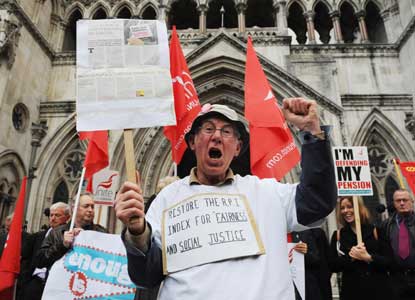By Richard Johnstone | 26 October 2011
The High Court has begun considering whether the government behaved lawfully in changing the inflation index for public sector pensions.

Ten unions are challenging the decision to switch from the Retail Prices Index to the Consumer Prices Index, which excludes housing costs. The move was announced by Chancellor George Osborne in the June 2010 emergency Budget in June 2010 and came into effect this April.
The change is part of the government’s reforms to public sector pensions, which also include planned contribution increases for teachers,NHS staff and civil servants and localgovernment workers.
While the government claims the CPI is the more appropriate index, the unions argue that the move is a deficit-reduction measure and should not have been implemented without consultation. They add that the government has not been willing to negotiate on the inflation link in talks on the package of reforms.
Two judicial reviews, being heard together, will now determine whether the Treasury acted lawfully in changing the indexation from the RPI measure which unions say is stated in the 1992 Social Security Administration Act. Hearings started yesterday and will last until Thursday, with a verdict expected within four weeks.
The Act requires an up-rating ‘in relation to the general level of prices obtaining in Great Britain estimated in such manner as the Secretary of State thinks fit’.
The unions involved in the actions include Unison, Unite, the GMB, the Public and Commercial Services union, Prospect and the FDA senior civil servants union.
A Unison spokeswoman said that, as the CPI is around 1.2% lower on average than RPI, the measure could cost public service workers up to 15% of the value of their pension.
Unison general secretary Dave Prentis added: ‘Unison is backing this judicial review because we cannot allow the coalition to run roughshod over pensioners.
‘The way that a country treats its citizens when they retire is a mark of a decent and fair society. The government has stepped over that mark – the switch is nothing but a cynical, multimillion pound raid on pensioners to pay down a deficit they did nothing to cause. This flawed measure of inflation does not even include housing costs – a major expenditure for many retired people.’
PCS general secretary Mark Serwotka said: ‘The switch from the RPI to the CPI is just another example of how this government wants public servants, pensioners and people entitled to benefits to pay the heaviest price for the recession.
‘As well as challenging this in court, the unions are mounting the widest, most co-ordinated industrial action we have seen in our lifetimes, to force the government to think again and show how out-of-touch millionaire ministers are with the lives and concerns of the rest of us.’
All the unions in the judicial review plan to take part in the day of action over pensions on November 30. They have either already balloted, or are currently balloting members, ahead of what could be the biggest strike for ageneration.
Responding to the court challenge, a Treasury spokewoman said: ‘The CPI is an internationally recognised, internationally comparable measure, the headline measure reported by the Office for National Statistics and is already used by the Bank of England to set its inflation target.
‘Unlike the RPI, the CPI is designed to take account of the fact that consumers tend to shop around, switching to cheaper alternatives when prices for similar goods change.’
Also today, the general secretaries of seven education trade unions presented a petition with more than 130,000 signatures to schools minister Nick Gibb, calling for the government to think again over the pension changes.
The campaign is being jointly organised by: the Association of School and College Leaders; the Association of Teachers and Lecturers; the National Association of Head Teachers; the National Association of Schoolmasters/Union of Women Teachers; the National Union of Teachers; the University and College Union; and the Welsh teaching union Undeb Cenedlaethol Athrawon Cymru.





















